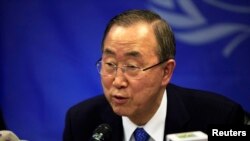Climate change, and not raging conflicts in some parts of the world, is the biggest threat to humanity, says United Nations Secretary General Ban Ki Moon.
Speaking at a press conference in Malabo, Equatorial Guinea, on the sidelines of the 23rd Ordinary Summit of the African Union, the UN chief said though conflicts around the world, in particular Syria, the Central African Republic and South Sudan, among others, should be addressed urgently, climate change was the worst threat to the existence of the human being.
Mr. Ban said the world is running out of time to address climate change and its effects.
He said climate change is frowned upon because it’s a “boring” subject resulting in journalists most of the times concentrating on security and conflict issues.
“People seem not to realize that much serious, more powerful, more deadly fires are burning,” said Mr. Ban.
“Climate change is the most serious threat, an imminent threat to humanity. The answer to save our human being and our planet earth is to take action now.”
He said world scientists have in the past few years submitted five successive reports making its clear climate change is happening and that urgent action is needed from world leaders.
“Unfortunately the member states have been realizing or having realized it (the effects of climate change), are not yet ready to fully address this issues,” said Mr. Ban.
“I’m asking world leaders that the time is now to act on climate change,” he said, adding media support in raising the issue would ensure everyone plays their part in efforts to save the world.
Earlier, Mr. Ban urged African leaders as climate vulnerable nations to take leadership role and be more vocal, speaking with one voice on the issue of climate change or their populations will face severe impacts from rising global temperatures.
“African leaders, you need to raise your voices, if not African leaders, than who?” the UN Chief asked.
“African countries and their people have contributed the least to climate change and yet at the same time, they are the most and the worst and most affected. Unfortunately most African countries do not have capacity and technology to mitigate this climate change and adapt.”
He said it is the seriousness of the climate change crisis that has forced him to call a climate change summit in New York in September, adding unless world leaders arrived at the meeting with “ambitious national targets and ambitious goals” the world would be in “serious danger”.
Countries are currently working towards a global climate change deal, set to be signed-off at a UN conference in Paris in December next year.
Africa only contributes 4% of greenhouse gas emissions, with developed countries and emerging economies likely to have to make the toughest greenhouse gas emissions cuts for any agreement to work.
Scientists say unless emissions peak by the end of this decade, the world is likely to experience dangerous levels of warming up to 3.5-4C above pre-industrial levels by the end of this century.
A UN climate science study published earlier this year warned in Africa, the biggest risk is to crop production, risks described as “very high” with or without adaptation with 4 degrees warming, and “medium” for 2 degrees with adaptation.




